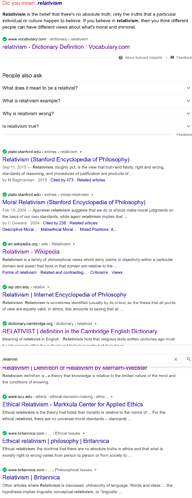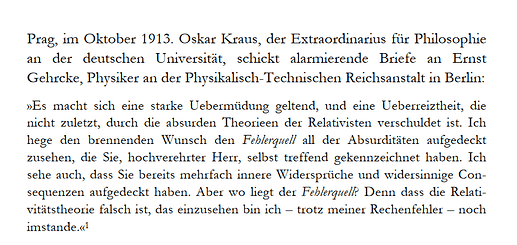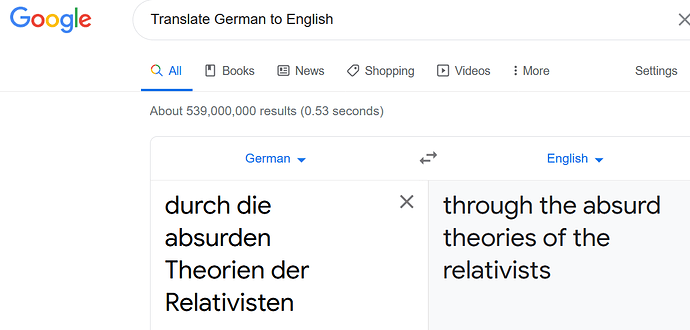@Terry_Sampson, prompted by your diagram, I have now spent some time reviewing a researching the SR / NLR topic and the discussion around absolute space and time and the ether and so on. It has been a while since I was more frequently across this topic, so I wanted to re-familiarize myself before commenting further. This is my response.
What you are putting forward is essentially wrong.
I admire the work and patience of @T_aquaticus in responding to you posts. Although I have enough science knowledge to do it, frankly I really just don’t have the inclination to do battle at the coal face with you, and certainly not the time. As I have said elsewhere, arguing science with non-scientists is usually futile. So I am going to cut to the chase here.
Firstly, you are putting yourself forward as a critic of well-supported scientific theory on the grounds that if does not comport with the kind of reality you need to fit with your particular biblical worldview. This is by your own words - although I am paraphrasing. You are an accountant with limited if no scientific training and entry level math skills at best, and are attempting to match wits with the greatest minds of the 20th century. So in addition to needing to see some humility in this discussion, let’s apply some of this parsimony everyone seems to like talking about.
What is more likely, that an accountant with a theological problem with the implications of a scientific theory may be wrong, or the virtual entirety of the world of physics is wrong? I think the former is more likely.
What is the simplest explanation of your problem here - is it that there is a problem with the science, OR a problem with your capacity to understand or accept the science? I think here it is the latter that is more likely.
I think your efforts would be better directed to thinking about why it is that you have difficulty letting go of your misconceptions, and why it is that you have devoted so much of your life to pursue this topic without once considering working to acquire the necessary math and science skills so that you would be equipped, at least in principle, to deal with these topics at the necessary depth and competence they demand.
Terry, I really don’t mean for this to be insulting to you. I am merely saying that I think you have gone about this the wrong way. I think it is a mistake personally for you to assume that everyone else is wrong, rather than consider that you might be wrong, and that just because you can’t make sense of something, does not mean it is incorrect. And, just because it does not align with your version of theology, does not mean it is incorrect. Reality does not care what you believe, it just is, and the evidence is against you here.
Besides this, you have not approached this whole thing scientifically yourself. To make this clearer for you, I recommend you go to @jammycakes website and read about how to disprove a scientific theory. James has done an excellent job of pointing out what you need to do to achieve that goal, and this is very different from what you have been doing. I understand you have sincere beliefs underlying all this, and I respect that you are passionate about it, but what you are presenting is not just lacking any sort of robustness, depth or evidence, it is counter to the accepted science ,so a much more cogent and organised approach is warranted.
Lastly, on the topic of this post. I will make some assumptions about your possible thinking here, and please correct me if I am wrong. I think that the implications of your attack on relativity, if correct, might be utilized in two ways: One, to undermine the notion that even science can know anything if it turns out that SR turns is wrong; and Two, to support a claim to the term ‘knowledge’ that you may have with regards your biblical worldview as it pertains to the nature of reality as fixed in space, which might be justified in your mind, if the established science about non-absolute spacetime - other than with respect to the speed of light - is wrong.
On the first point, I have said that with regards scientific knowledge, that there is no such thing as certainty, and there is always the possibility that science can be wrong. Thus all scientific knowledge - remembering that this is a composite of hypothesis, experiment, facts, data, evidence, mathematical analysis, and theory - and here I am referring to just the theory , is treated as provisional. We say it is as close to the ideal of knowledge we can be sure of, without being ultimately 100% certain. Thus, I see no point here that undermines the concept of knowledge that I have put forward, and nothing that would undermine the concepts of knowledge that broadly underpin the scientific endeavor.
On the second point, no matter how much you repeat your doubts about the science here, you are really only asserting an opinion without any evidence, and providing no cogent alternative theory (that hasn’t already been soundly debunked) to explain the results or any form or mathematical presentation or argument that would tip the balance in your favor. Merely casting doubt as a layperson on well-established science, does nothing to bolster theological claims to knowledge. What you have Terry, is a belief that drives your desire to try to discredit the science. That is all. What you need though is either to work on the problem using the proper knowledge and skills, or on yourself and your personal challenge of accepting the scientific evidence even if it conflicts with your theology.




